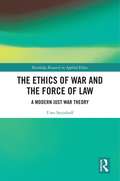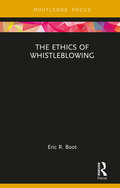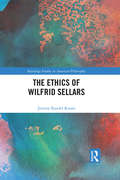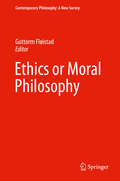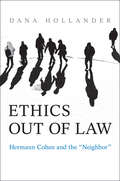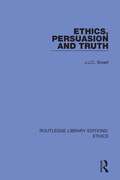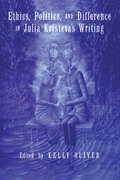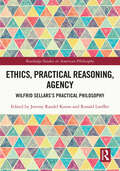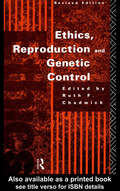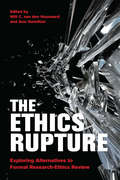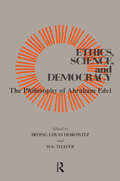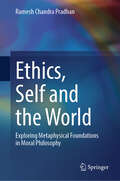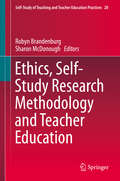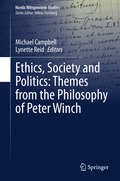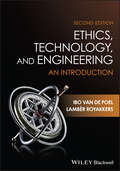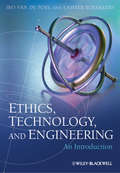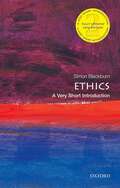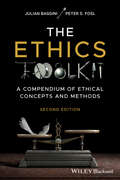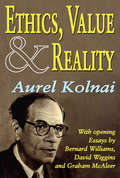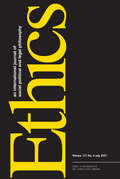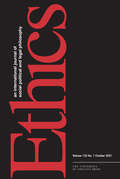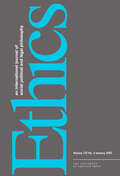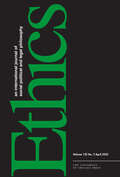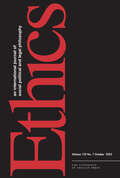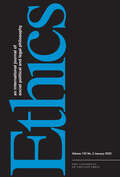- Table View
- List View
The Ethics of War and the Force of Law: A Modern Just War Theory (Routledge Research in Applied Ethics)
by Uwe SteinhoffThis book provides a thorough critical overview of the current debate on the ethics of war, as well as a modern just war theory that can give practical action-guidance by recognizing and explaining the moral force of widely accepted law. Traditionalist, Walzerian, and "revisionist" approaches have dominated contemporary debates about the classical jus ad bellum and jus in bello requirements in just war theory. In this book, Uwe Steinhoff corrects widely spread misinterpretations of these competing views and spells out the implications for the ethics of war. His approach is unique in that it complements the usual analysis in terms of self-defense with an emphasis on the importance of other justifications that are often lumped together under the heading of "lesser evil." It also draws on criminal law and legal scholarship, which has been largely ignored by just war theorists. Ultimately, Steinhoff rejects arguments in favor of "moral fundamentalism"— the view that the laws and customs of war must simply follow an immutable morality. In contrast, he argues that widely accepted laws and conventions of war are partly constitutive of the moral rules that apply in a conflict. The Ethics of War and the Force of Law will be of interest to scholars and advanced students working in just war theory, applied ethics, political philosophy, political theory, philosophy of law, and criminal and military law.
The Ethics of Whistleblowing (Routledge Focus on Philosophy)
by Eric R. BootFollowing the enormous political, legal, and media interest that has surrounded high profile cases of whistleblowing, such as Chelsea Manning and Edward Snowden, the fundamental ethical questions surrounding whistleblowing have often been obscured. In this fascinating book Eric Boot examines the ethical issues at stake in whistleblowing. Can the disclosure of classified government documents ever be justified? If so, how? Why does it require justification in the first place? Can there ever be a duty to blow the whistle? When is breaking the law justified? On a more practical level, this book also considers the various whistleblower protection documents and finds them often lacking in consistency and clarity, before providing an argument for a plausible "public interest" defense for whistleblowers.
The Ethics of Wilfrid Sellars (Routledge Studies in American Philosophy)
by Jeremy Randel KoonsWilfrid Sellars’s ethical theory was rich and deeply innovative. On Sellars’s view, moral judgments express a special kind of shared intention. Thus, we should see Sellars as an early advocate of an expressivism of plans and intentions, and an early theorist of collective intentionality. He supplemented this theory with a sophisticated logic of intentions, a robust theory of the categorical validity of normative expressions, a subtle way of reconciling the cognitive and motivating aspects of moral judgment, and much more—all within a strict nominalism that preserves Sellars’s commitment to naturalism. The Ethics of Wilfrid Sellars offers the first systematic treatment of this sadly-neglected aspect of Sellars’s work, and demonstrates that his ethical theory—just like his more widely-discussed epistemology—has much to contribute to current debates.
Ethics or Moral Philosophy
by Guttorm FløistadThis volume examines a variety of philosophical approaches that seek to formulate practical guidelines or norms for human actions and behavior in different areas of society, including politics, cultural traditions, the environment, business management, architecture, and medicine. Written by a team of international authors, this volume features thirteen surveys. It begins with an exploration of ethics in politics and cultural traditions. From genocide to the unequal distribution of wealth, it examines many of the harms that currently affect societies throughout the world and considers a way that those in politics can follow to provide better care for all their populations. Next, the book looks at the relation between ethics and cultural traditions. It features a paper that examines the tension that often exists between the past and the present, with a special focus on the history of India. This volume also considers the idea of a universal system of ethics, presents a practical approach to value-based management in private and public organizations, and examines ethics in medicine. In addition, this volume includes coverage of a new type of ethics called Eco-ethica, proposed by the Japanese philosopher Tomonobu Imamichi, which seeks to answer the question of how men and women can "live better" or "live together with each other" in a systematized, technological age.
Ethics Out of Law: Hermann Cohen and the “Neighbor”
by Dana HollanderHermann Cohen (1842–1918) was a leading figure in the Neo-Kantian philosophical movement that dominated European thought before 1918. He is also the inaugural figure for what is meant by "modern Jewish philosophy" in the twentieth and twenty-first centuries. This book explores Cohen’s striking claim that ethics is rooted in law – a claim developed in both his philosophical ethics and his philosophy of Judaism, in particular in his writings on "love-of-neighbor," up to and including his well-known Religion of Reason. Dana Hollander proposes that neither Cohen’s systematic philosophy nor his "Jewish" philosophy should be seen as the dominant framework for his oeuvre as a whole, but that his understanding of key philosophical questions takes shape in the passages between both corpuses, a trait that could be seen as paradigmatic for modern Jewish philosophy. Ethics Out of Law taps into one of the prime topics of current interest in the field of Jewish philosophy: the nature of Jewish political existence and the changing configurations of "law" that this entails.
Ethics, Persuasion and Truth
by J. J. SmartOriginally published in 1984, deals with meta-ethics – that is the semantics and pragmatics of ethical language. This book eschews the notions of meaning and analyticity on which meta-ethics normally depends. It discusses questions of free will and responsibility and the relations between ethics on the one hand and science and metaphysics on the other. The author regards ethics as concerned with deciding what to do and with persuading others – not with exploring a supposed realm of ethical fact.
Ethics, Politics, and Difference in Julia Kristeva's Writing
by Kelly OliverFirst published in 1993. Routledge is an imprint of Taylor & Francis, an informa company.
Ethics, Practical Reasoning, Agency: Wilfrid Sellars’s Practical Philosophy (Routledge Studies in American Philosophy)
by Jeremy Randel Koons Ronald LoefflerThis is the first volume devoted exclusively to the practical philosophy of Wilfrid Sellars. It features original essays by leading Sellars scholars that examine his ethical theory, his theory of practical reasoning, and his theory of intentional agency. While most scholarship on Sellars’s philosophy has focused on his epistemology, metaphysics, or philosophy of language and mind, Sellars himself regarded his practical philosophy as central to his overall project of situating rational beings within the natural order. The chapters in this volume address this neglected area of Sellars’s philosophy. The chapters are divided into thematic sections covering Sellars’s theory of we-intentions – influential in contemporary debates on collective intentionality – naturalism and the manifest image, and the moral point of view. Together, they demonstrate how Sellars’s practical philosophy contributes to important debates in contemporary philosophy regarding, for example, expressivist approaches to moral thought and group agency in the collective intentionality literature. Ethics, Practical Reasoning, Agency: Wilfrid Sellars’s Practical Philosophy will appeal to scholars and advanced students interested in Wilfrid Sellars, American philosophy, and ethics.
Ethics, Reproduction and Genetic Control
by Ruth F. ChadwickIn this revised edition with a new preface from the editor, leading scientists explain the nature and goals of `test tube' reproduction and genetic engineering, and their eugenic implications. In contrast to the Warnock report, the extended commentary considers the issues in the context of a social ethic rather than the individualist viewpoint.
The Ethics Rupture: Exploring Alternatives to Formal Research-Ethics Review
by Ann Hamilton Will C. van den HoonaardFor decades now, researchers in the social sciences and humanities have been expressing a deep dissatisfaction with the process of research-ethics review in academia. Continuing the ongoing critique of ethics review begun in Will C. van den Hoonaard's Walking the Tightrope and The Seduction of Ethics, The Ethics Rupture offers both an account of the system's failings and a series of proposals on how to ensure that social research is ethical, rather than merely compliant with institutional requirements.Containing twenty-five essays written by leading experts from around the world in various disciplines, The Ethics Rupture is a landmark study of the problems caused by our current research-ethics system and the ways in which scholars are seeking solutions.
Ethics, Science, and Democracy: Philosophy of Abraham Edel
by Irving Louis Horowitz H. S. ThayerThis volume, modeled after those published in The Library of Living Philosophers, attempts to provide a coherent statement of the work of Abraham Edel in moral and political theory, and on the impact of his work on such diverse areas as education, law, and social science.
Ethics, Self and the World: Exploring Metaphysical Foundations in Moral Philosophy
by Ramesh Chandra PradhanThis book delves into the profound question of whether moral philosophy rests upon metaphysical foundations. Contrary to the assertions of moral relativists such as John Mackie and Bernard Williams, who contend that ethics is devoid of metaphysical grounding, this work challenges their claims. Designed for those who approach morality and view ethics as a subject firmly anchored in metaphysics, this book is an essential exploration. It delves into the metaphysical underpinnings of morality, examining the source of morality in the metaphysical self, the intricate relations between ethics, self and the world and the interplay between ethics and metaphysics. It tackles fundamental questions, such as why freedom is the foundational postulate of morality and why, akin to Kant, we must acknowledge the importance of moral law. Furthermore, the chapters explore the nature of values and their metaphysical standing, the practical application of morality in the real world, the essence of virtues as attributes of the human soul, the interconnectedness of morality with rationality and spirituality and the challenges ethics faces from relativism and naturalism. The book appeals to moral philosophy researchers and students interested in unraveling morality's metaphysical roots. It offers an investigative exploration of the intricacies surrounding the problems of morality.
Ethics, Self-Study Research Methodology and Teacher Education (Self-Study of Teaching and Teacher Education Practices #20)
by Robyn Brandenburg Sharon McDonoughThis book examines the nuanced and situated experiences of self-study researchers. It explores the ways in which ethics are dynamic, idiosyncratic and require an ongoing ethical reflexivity. In addition, the book identifies, documents and collates the collective experiences of self-study researchers and sheds new light on the role and impact of ethics, ethical dilemmas and ensuing decisions for education researchers.The book considers the ethical dilemmas that self-study researchers in teacher education face, their careful ethical considerations while conducting research, and how they form their professional judgment and understanding of what it means to be an ethical self-study researcher. For self-study researchers, there are a number of ethical dilemmas and challenges that cannot be neatly captured by the frameworks and guidelines of an ethics board. For many, this requires researchers to be ever-present and re-engaged with the ethics of their own projects, from the development, through to the dissemination of their work.Readers will gain a deeper understanding of ethics, ethical perspectives and practices in the field of self-study research.
Ethics, Society and Politics: Themes from the Philosophy of Peter Winch (Nordic Wittgenstein Studies #6)
by Michael Campbell Lynette ReidThis volume is a reappraisal of the work of Peter Guy Winch (1926 -1997), one of the most important philosophers of the 20th Century. Winch faded into relative obscurity compared to his contemporaries due to a mistaken belief that there are no systematic connections between the different aspects of his work. This volume corrects that presupposition and reintroduces Winch's work to a new generation of scholars. By showing how ethical, political and social issues are interrelated in Winch's work, and by making clear the connections between these issues and themes in metaphysics and the philosophy of mind, the volume demonstrates both the breadth and the unity of Winch's approach. It discusses topics such as ethics, political philosophy, social science, the philosophy of action, the philosophy of mind, metaphysics, and the philosophy of language. Despite this apparent variety of topics, the contributors to the volume share Winch's conviction that the different areas of philosophy are interdependent. As a result, the volume as a whole shows unity in diversity and provides an example of a manner of philosophising in which different approaches and sub-disciplines are placed in dialogue with each other. Peter Guy Winch is most famous for his early work on the philosophy of the social sciences. His On the Idea of a Social Science and its Relation to Philosophy (ISS) generated controversy within both philosophical and social scientific circles. In that work and subsequent publications Winch argued against the presupposition that social relations could be understood using the conceptual tools of the natural sciences. Winch would later describe ISS as a 'young man's book' and would come to regret the reputation it garnered him - a mixture of roughly equal degrees fame and infamy. Alongside his work on the philosophy of social sciences, Winch was an interpreter and exegete of Wittgenstein. He also published a ground-breaking study of the philosophy of Simone Weil, entitled Simone Weil: The Just Balance. Winch also published numerous essays on issues in ethics, political philosophy and the philosophy of religion, and at his death was working on a book manuscript on the problem of political authority.
Ethics, Technology, and Engineering: An Introduction
by Ibo van de Poel Lamber RoyakkersExplore the moral and ethical issues which arise at the intersection of novel technology and engineering In Ethics, Technology, and Engineering: An Introduction, a team of distinguished researchers delivers an insightful and thought-provoking exploration of some of the toughest ethical questions found at the crossroads of engineering and technology. The book demonstrates the skills necessary to effectively grapple with ethical issues that arise from the practice of engineering. The authors introduce the “ethical cycle,” a unique and systematic approach to dealing with ethical problems. They utilize numerous real-life case studies from the United States, Europe, and elsewhere to shed important light on the ethical issues that arise in the daily work of practicing engineers. They also provide a comprehensive overview of various ethical frameworks used in engineering, including utilitarianism, deontological ethics, virtue ethics, Ubuntu, and Confucianism. Readers will also find: A thorough introduction to a practice-oriented approach to ethical decision-making in engineering Comprehensive explorations of the “ethical cycle,” an approach that encourages students to consider a diversity of ethical viewpoints and come to reasoned and justified judgments Practical discussions of ethical issues in engineering design, technological risks, and moral responsibility Treatments of sustainability and how it affects professionals working in engineering, as well as responsible innovationPerfect for engineers, technologists, and entrepreneurs, Ethics, Technology, and Engineering: An Introduction will also benefit businesspeople and founders interested in the ethical implications of a variety of fascinating new technologies.
Ethics, Technology, and Engineering: An Introduction
by Ibo van de Poel Lamb¿r RoyakkersFeaturing a wide range of international case studies, Ethics, Technology, and Engineering presents a unique and systematic approach for engineering students to deal with the ethical issues that are increasingly inherent in engineering practice. Utilizes a systematic approach to ethical case analysis -- the ethical cycle -- which features a wide range of real-life international case studies including the Challenger Space Shuttle, the Herald of Free Enterprise and biofuels. Covers a broad range of topics, including ethics in design, risks, responsibility, sustainability, and emerging technologies Can be used in conjunction with the online ethics tool Agora (http://www.ethicsandtechnology.com) Provides engineering students with a clear introduction to the main ethical theories Includes an extensive glossary with key terms
The Ethics Toolkit: A Compendium Of Ethical Concepts And Methods
by Julian Baggini Peter S. FoslThe Ethics Toolkit provides an accessible and engaging compendium of concepts, theories, and strategies that encourage students and advanced readers to think critically about ethics so that they can engage intelligently in ethical study, thought, and debate. Written by the authors of the popular The Philosophers' Toolkit (Blackwell, 2001); Baggini is also a renowned print and broadcast journalist, and a prolific author of popular philosophy books Uses clear and accessible language appropriate for use both inside and beyond the classroom Enlivened through the use of real-world and hypothetical examples Cross-referencing of entries helps to connect and contrast ideas Features lists of prominent ethics organizations and useful websites Encourages readers to think critically about ethics and teaches them how to engage intelligently in ethical study, thought, and debate
The Ethics Toolkit: A Compendium of Ethical Concepts and Methods
by Julian Baggini Peter S. FoslA new edition of the bestselling guide which equips readers with the skills necessary for engaging in ethical reflection The Ethics Toolkit offers an engaging and approachable introduction to the core concepts, principles, and methods of contemporary ethics. Explaining to students and general readers how to think critically about ethics and actually use philosophical concepts, this innovative volume provides the tools and knowledge required to engage intelligently in ethical study, deliberation, and debate. Invaluable as both a complete guide and a handy reference, this versatile resource provides clear and authoritative information on a diverse range of topics, from fundamental concepts and major ethical frameworks to contemporary critiques and ongoing debates. Throughout the text, Fosl and Baggini highlight the crucial role ethics plays in our lives, exploring autonomy, free will, consciousness, fairness, responsibility, consent, intersectionality, sex and gender, and much more. Substantially revised and expanded, the second edition of The Ethics Toolkit contains a wealth of new entries, new recommended readings, more detailed textual references, and numerous timely real-world and hypothetical examples. Uses clear and accessible language appropriate for use inside and beyond the classroom Contains cross-referenced entries to help readers connect and contrast ideas Engages both non-Western and Western philosophy Offer insights into key issues in ethics with a firm grounding in the history of philosophy Includes an appendix of tools for the practice of ethics, including links to podcasts, web and print resources, and prominent ethics organizations Written by the authors of the popular The Philosophers’ Toolkit, this new edition of The Ethics Toolkit is a must-have resource for anyone interested in ethics, from general readers to undergraduate and graduate students.
Ethics, Value, and Reality: Selected Papers Of Aurel Kolnai
by Aurel KolnaiEthics, Value, and Reality is a collection of essays written after Kolnai settled in England in 1955. These essays from Kolnai's mature years sit atop a remarkable gestation of moral and political thinking. At the heart of his thought is the special role of privilege in a good social order. Kolnai relies heavily on the work of late nineteenth- and early twentieth-century value theorists such as Alexius Meinong, Nicolai Hartmann, and Max Scheler. He blends this continental tradition of ethics with British intuitionism and Scottish Enlightenment articulations.For Kolnai, ethical life cannot be adequately understood except by reference to moral emphasis, and thus, Kolnai can be thought of as a liberal conservative. He acknowledges myriad values, moral and non-moral, and accepts that all can have some claim upon us. Low values as much as high values have a legitimate claim. His is a tolerant conservatism though not for a moment does he forgo the necessity of judgment: a readily graspable hierarchy keeps the respective demands of values in proportion. Kolnai welcomes the call to seriousness, which is the hallmark of existentialism.The ground of Kolnai's thought is the idea of emotion as cognitive. He saw the typical analytical philosopher's fascination with simplicity of explanation not only thoroughly refuted by the gains in understanding wrought by phenomenological method, with its deference to the richness of phenomena, but sensed in the monistic inclination he dreaded a harbinger of totalitarianism. Never denying his emotionalism, he nonetheless made his points well enough by adopting an analytical approach to philosophy and ethics. This is a major work crossing moral and political philosophy.
Ethics, volume 131 number 4 (July 2021)
by EthicsThis is volume 131 issue 4 of Ethics. Ethics features scholarly work that covers a range of topics pertaining to moral, political, and legal philosophy from a variety of intellectual perspectives, including social and political theory, law, and economics. Articles in the journal present new theories, apply theory to contemporary moral issues, and focus on historical works that have significant implications for contemporary theory. In addition to major articles, Ethics publishes critical discussions, symposia, review essays, and book reviews.
Ethics, volume 132 number 1 (October 2021)
by EthicsThis is volume 132 issue 1 of Ethics. Ethics features scholarly work that covers a range of topics pertaining to moral, political, and legal philosophy from a variety of intellectual perspectives, including social and political theory, law, and economics. Articles in the journal present new theories, apply theory to contemporary moral issues, and focus on historical works that have significant implications for contemporary theory. In addition to major articles, Ethics publishes critical discussions, symposia, review essays, and book reviews.
Ethics, volume 132 number 2 (January 2022)
by EthicsThis is volume 132 issue 2 of Ethics. Ethics features scholarly work that covers a range of topics pertaining to moral, political, and legal philosophy from a variety of intellectual perspectives, including social and political theory, law, and economics. Articles in the journal present new theories, apply theory to contemporary moral issues, and focus on historical works that have significant implications for contemporary theory. In addition to major articles, Ethics publishes critical discussions, symposia, review essays, and book reviews.
Ethics, volume 132 number 3 (April 2022)
by EthicsThis is volume 132 issue 3 of Ethics. Ethics features scholarly work that covers a range of topics pertaining to moral, political, and legal philosophy from a variety of intellectual perspectives, including social and political theory, law, and economics. Articles in the journal present new theories, apply theory to contemporary moral issues, and focus on historical works that have significant implications for contemporary theory. In addition to major articles, Ethics publishes critical discussions, symposia, review essays, and book reviews.
Ethics, volume 133 number 1 (October 2022)
by EthicsThis is volume 133 issue 1 of Ethics. Ethics features scholarly work that covers a range of topics pertaining to moral, political, and legal philosophy from a variety of intellectual perspectives, including social and political theory, law, and economics. Articles in the journal present new theories, apply theory to contemporary moral issues, and focus on historical works that have significant implications for contemporary theory. In addition to major articles, Ethics publishes critical discussions, symposia, review essays, and book reviews.
Ethics, volume 133 number 2 (January 2023)
by EthicsThis is volume 133 issue 2 of Ethics. Ethics features scholarly work that covers a range of topics pertaining to moral, political, and legal philosophy from a variety of intellectual perspectives, including social and political theory, law, and economics. Articles in the journal present new theories, apply theory to contemporary moral issues, and focus on historical works that have significant implications for contemporary theory. In addition to major articles, Ethics publishes critical discussions, symposia, review essays, and book reviews.
